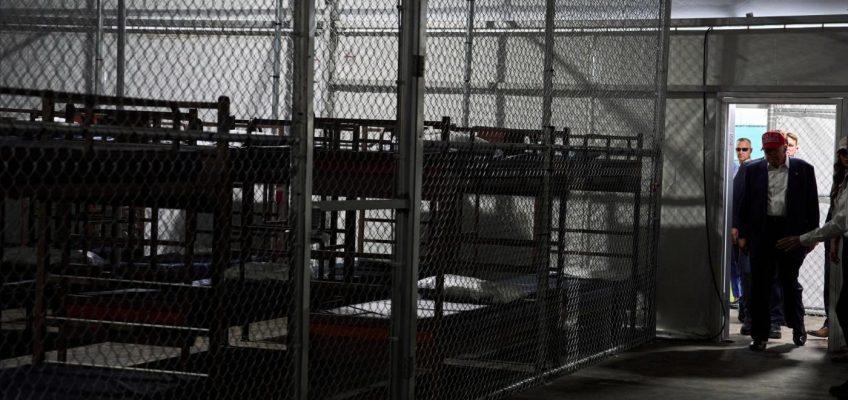By MIKE SCHNEIDER and CURT ANDERSON, Associated Press
ORLANDO, Fla. (AP) — A federal judge has put a stop to further expansion of the immigration detention center built in the Florida Everglades and dubbed “Alligator Alcatraz,” ordering that its operations wind down within two months.
U.S. District Judge Kathleen Williams in Miami wrote in her 82-page order late Thursday that Florida officials never sufficiently explained why an immigration detention center needed to be located in the middle of sensitive wetlands cherished by environmentalists and outdoors people.
She also said that state and federal authorities never undertook an environmental review as required by federal law before Florida officials hastily built the detention camp which they championed as a model for President Donald Trump’s immigration policies. That failure adversely affected the “recreational, conservational, and aesthetic interests” of the environmental groups and Miccosukee Tribe which brought the lawsuit, she said.
Republican Gov. Ron DeSantis on Friday reacted to the ruling, saying he would not be deterred by “an activist judge.”
“We knew this would be something that would likely happen,” DeSantis said at a news conference in Panama City. “We will respond accordingly. You either have a country or you don’t.”
Here’s what to know about the situation and what might come next:
What did the judge say?
Williams said she expected the population at the facility to drop within 60 days by transferring detainees to other facilities. Once that happens, fencing, lighting, gas, waste, generators and other equipment should be removed from the site. No additional detainees can be sent to the facility, and no more additional lighting, fencing, paving, buildings or tents can be added to the camp. The only repairs that can be made to the existing facility are for safety purposes. However, the judge allowed for the existing dormitories and housing to stay in place as long as they are maintained to prevent deterioration or damage.
A sign marks the entrance to the Baker Correctional Institution, Sanderson, Fla., Thursday, Aug. 14, 2025. (AP Photo/Gary McCullough)
Here’s where detainees might end up
During court hearings, lawyers said at one point there were fewer than 1,000 detainees at the facility, which state officials had planned to hold up to 3,000 people. Although the detainees could be sent to other facilities out of state, Florida has other immigration detention centers including the Krome North Processing Center in Miami, the Broward Transitional Center in Pompano Beach and the Baker County Detention Center managed by the local sheriff’s office. Earlier this month, DeSantis announced plans for a second state-initiated immigration detention facility dubbed “Deportation Depot” at a state prison about 43 miles west of downtown Jacksonville. State officials say it is expected to hold 1,300 immigration detention beds, though that capacity could be expanded to 2,000 beds.
How does this decision impact the other “Alligator Alcatraz” lawsuit?
Civil rights lawyers had filed a second lawsuit over practices at “Alligator Alcatraz,” claiming that detainees weren’t able to meet with their attorneys privately and were denied access to immigration courts. Another federal judge in Miami dismissed part of the lawsuit earlier this week after the Trump administration designated the Krome North Processing Center as the court for their cases to be heard. The judge moved the remaining counts of the case from Florida’s southern district to the middle district. Eunice Cho, the lead attorney for the detainees, said Friday that the decision in the environmental lawsuit won’t have an impact on the civil rights case since there could be detainees at the facility for the next two months.
“Our case addresses the lack of access to counsel for people detained at Alligator Alcatraz, and there are still people detained there,” Cho said.
Related Articles
Trump embraces tough-on-crime mantra amid DC takeover as he and Democrats claim political wins
Trump says he’ll keep extending TikTok shutdown deadline
Despite federal shift, state health officials encourage COVID vaccines for pregnant women
Trump’s death penalty push faces setbacks as judges block attempts to reverse prior decisions
Trump’s new RNC chairman Joe Gruters is a longtime believer. Here’s what to know about him
Status of the hundreds of millions of dollars in contracts
No one has said publicly what will happen to the hundreds of millions of dollars in contracts involved in the facility. DeSantis’ administration in July signed contracts with private vendors to pay at least $245 million to set up and run the center, according to a public database. That amount — to be fronted by Florida taxpayers — was in line with the $450 million a year officials have estimated the facility was going to cost. The governor’s office and the Florida Division of Emergency Management on Friday didn’t respond to questions about whether Florida taxpayers would still be on the hook for the contracts if the facility is shuttered.
Is this a final decision?
No. This case will continue to be litigated. The state of Florida filed a notice of appeal Thursday night, shortly after the ruling was issued. As its name suggests, a preliminary injunction is only an initial action taken by a judge to prevent harm while a lawsuit makes its way through the court process and when it appears that one side has a good chance of succeeding based on the merits of the case.
Follow Mike Schneider on the social platform Bluesky: @mikeysid.bsky.social


Leave a Reply